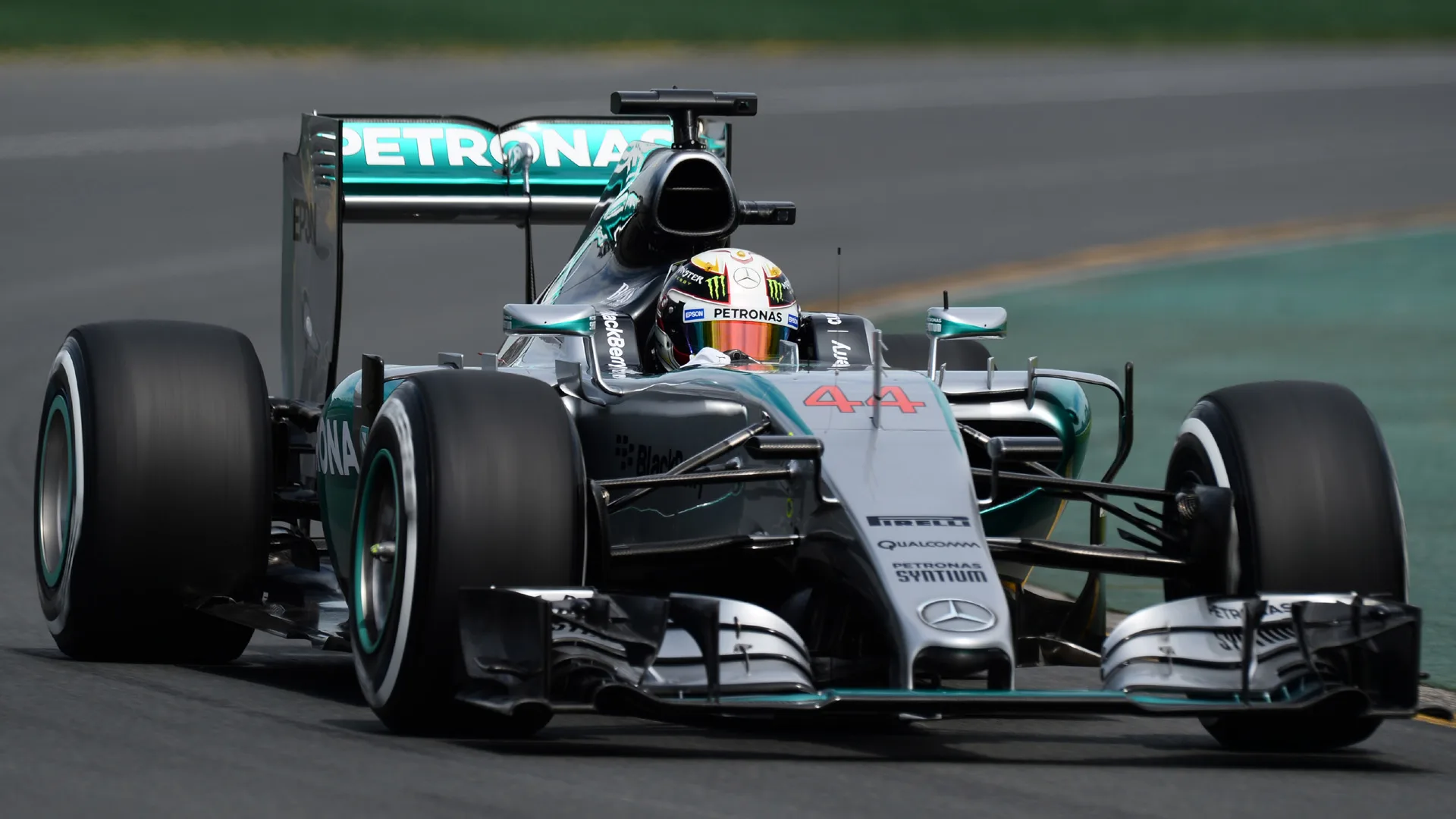From the prospect of a two-horse race to the tantalising intra-team battle at Toro Rosso, and from a potentially titanic scrap between Williams and Ferrari to a damage limitation exercise for McLaren. We break down the key storylines to look out for in the 2015 Formula 1 Rolex Australian Grand Prix…
Mercedes in a race of their own
Few came to Melbourne expecting to see anyone other than Mercedes occupying the front row, but the level of the Silver Arrows' domination has been nothing short of emphatic. Having finished one-two in each of the three practice sessions at Albert Park, Lewis Hamilton and Nico Rosberg rammed home their advantage in qualifying.
In Q1 the duo were the only drivers not to run the soft tyres, and yet Rosberg, who was the slower of the two in the segment, still finished three-tenths of a second clear of Williams’ Felipe Massa, their closest challenger. Hamilton was a full six-tenths ahead, and when Mercedes finally bolted on the quicker rubber in Q3 his advantage grew to a staggering 1.3s over Massa, who remained the biggest threat.
On that evidence, it seems safe to assume that if their cars hold together - and they avoid taking each other off - Hamilton and Rosberg will be in a race of their own on Sunday. The good news is Mercedes remain committed to letting their drivers race, so even if the silver cars disappear into the distance we could still see a pulsating fight for victory.
Having lost out to his team mate at last year’s season finale, Rosberg is keener than ever to steal an early march on Hamilton, but judging by the way the world champion turned on the style when it mattered in qualifying, it’ll likely take a monumental performance to deny him victory.
Mileage McLaren's priority Given their problems in winter testing, McLaren knew they wouldn’t be bothering the front end of the grid in qualifying, but you suspect not even in Ron Dennis’s wildest nightmares did they think they’d be starting Sunday’s race on the back row.
Hamstrung by a lack of power, made worse by Honda’s need to take a conservative approach to engine mapping, Jenson Button and Kevin Magnussen could barely get within three seconds of Mercedes in Q1, despite using the racier soft tyres. Throw in the fact that the MP4-30 was consistently at the bottom of the speed trap figures and that Button has never managed more than 12 laps in a single stint and the outlook for the race looks gloomier still.
At this point, every kilometre covered is crucial for the Woking team and their Japanese partners, and you sense that it would be a real achievement if they could get one, if not both of their cars home in the race.
It’s all a far cry from McLaren and Honda’s last race together in 1992, which coincidentally was also in Australia. On that occasion, Gerhard Berger signed off the partnership in style, pipping Michael Schumacher to victory. On current form, it’ll be a long time before champagne corks are popping again.
Tight battle to continue between Toro Rosso rookies On the eve of the season, having eyed up his charges during testing, Toro Rosso team principal Franz Tost confidently predicted that Carlos Sainz Junior and Max Verstappen would be extremely evenly matched in 2015 - and so it’s proved in Melbourne.
From the moment the green light came on at the start of FP1 on Friday, the rookie duo have been locked together, regularly trading places on the timesheets. In qualifying it was Sainz, the slightly more senior, slightly more experienced of the two drivers who got the upper hand, brilliantly forcing his way into the top ten shootout before sealing eighth on the grid. But 12th was by no means a disastrous result for Verstappen, and given he has the choice of which tyres to start on, there’s every possibility the 17-year-old could quickly find himself within striking distance of his team mate.
Given the STR10’s impressive pace, which surprised many, points now look a real possibility for both drivers, so it’s not inconceivable that on the same day he becomes the youngest person in history to start a Grand Prix, Verstappen could also become F1 racing’s youngest ever points scorer. For someone with only one season of car racing under his belt, that would be nothing short of astonishing.
Home hero Ricciardo ready for battle Having seen their hero stripped of second place at last year’s race because of a technical irregularity, the legions of home fans who flocked to Albert Park on Saturday were desperate for Daniel Ricciardo to secure a good starting berth for Sunday’s race. Sadly for them, the effervescent Aussie could only manage seventh on the grid, but given the problems he has experienced this weekend – including missing FP2 in its entirety and then seeing one of his four allocated engines for this season consigned to the recycling – it could have been a lot worse.
“The drivability has been tricky,” said Ricciardo of his Renault-powered RB11. “We suffered a bit this time last year, but there are a few more issues this year which weren’t expected, but it’s how it is and we need to try and sort it out. I’m really happy with seventh as realistically that’s the best we could have done today. The progress we made through qualifying is real and hopefully we can carry that on for the race.”
How much progress Ricciardo will be able to make in the race is difficult to say, particularly in the face of strong opposition from Williams and a resurgent Ferrari team (see below), but you can bet your bottom dollar he’ll be roared on from start to finish.
Nothing to choose between Williams and Ferrari Less than 0.1 seconds covered Felipe Massa, Sebastian Vettel and Kimi Raikkonen in the fight for third in qualifying, while Valtteri Bottas was just 0.3s down the road despite struggling with back pain. All the evidence suggests there will be little to separate the four drivers over a race distance.
Intriguingly, both Williams and Ferrari believe their long-run pace could prove their trump card. Williams, who counted it among their strong suits last year, dedicated a fair amount of their pre-season to long-run simulations. “The car has shown very good long-run pace,” says Williams head of performance engineering Rob Smedley, “which will stand us in good stead tomorrow.”
Ferrari meanwhile have looked impressively quick over longer runs, particularly in Australia, to the extent that Vettel believes Ferrari might have the upper hand on Sunday. With so little to choose between the two teams already, the prospect of a race-long, four-way fight is one to savour.
Two stops the likely strategy Another reason the Williams/Ferrari scrap looks so fascinating is the relatively limited scope for strategic diversity in Australia. A one-stop strategy would theoretically be possible, but it’s unlikely to be the quickest option for the frontrunners given the need to handle traffic and the potential for Safety Car interruptions (rated by Pirelli as 55 percent).
A standardised two-stop strategy is therefore more likely, which would see the cars starting on the yellow-marked soft compound, pitting for more softs at around lap 27, and then pitting for the white-marked mediums late on, at around lap 52. Expect most to follow this path - although one or two further down the field may feel a one-stop is worth a gamble.
Next Up
Related Articles
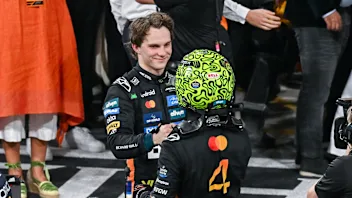 Piastri 'will be a world champion' in future – Norris
Piastri 'will be a world champion' in future – Norris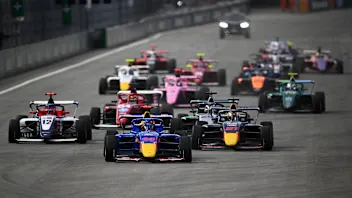 F1 ACADEMY unveils calendar for 2026 season
F1 ACADEMY unveils calendar for 2026 season Norris collects World Championship trophy at FIA Awards
Norris collects World Championship trophy at FIA Awards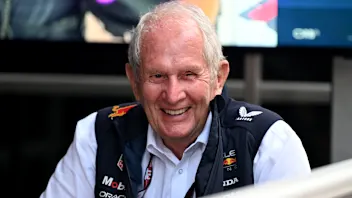 TremayneWhy ‘true racer’ Marko will be missed as he leaves Red Bull
TremayneWhy ‘true racer’ Marko will be missed as he leaves Red Bull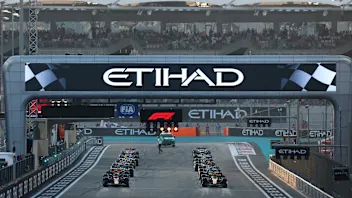 This Week in F110 quiz questions on the Abu Dhabi title decider
This Week in F110 quiz questions on the Abu Dhabi title decider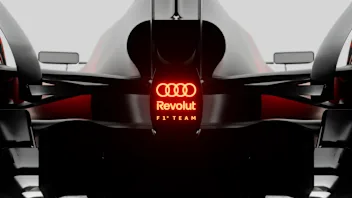 Audi announce team name and global launch date for 2026 challenger
Audi announce team name and global launch date for 2026 challenger
